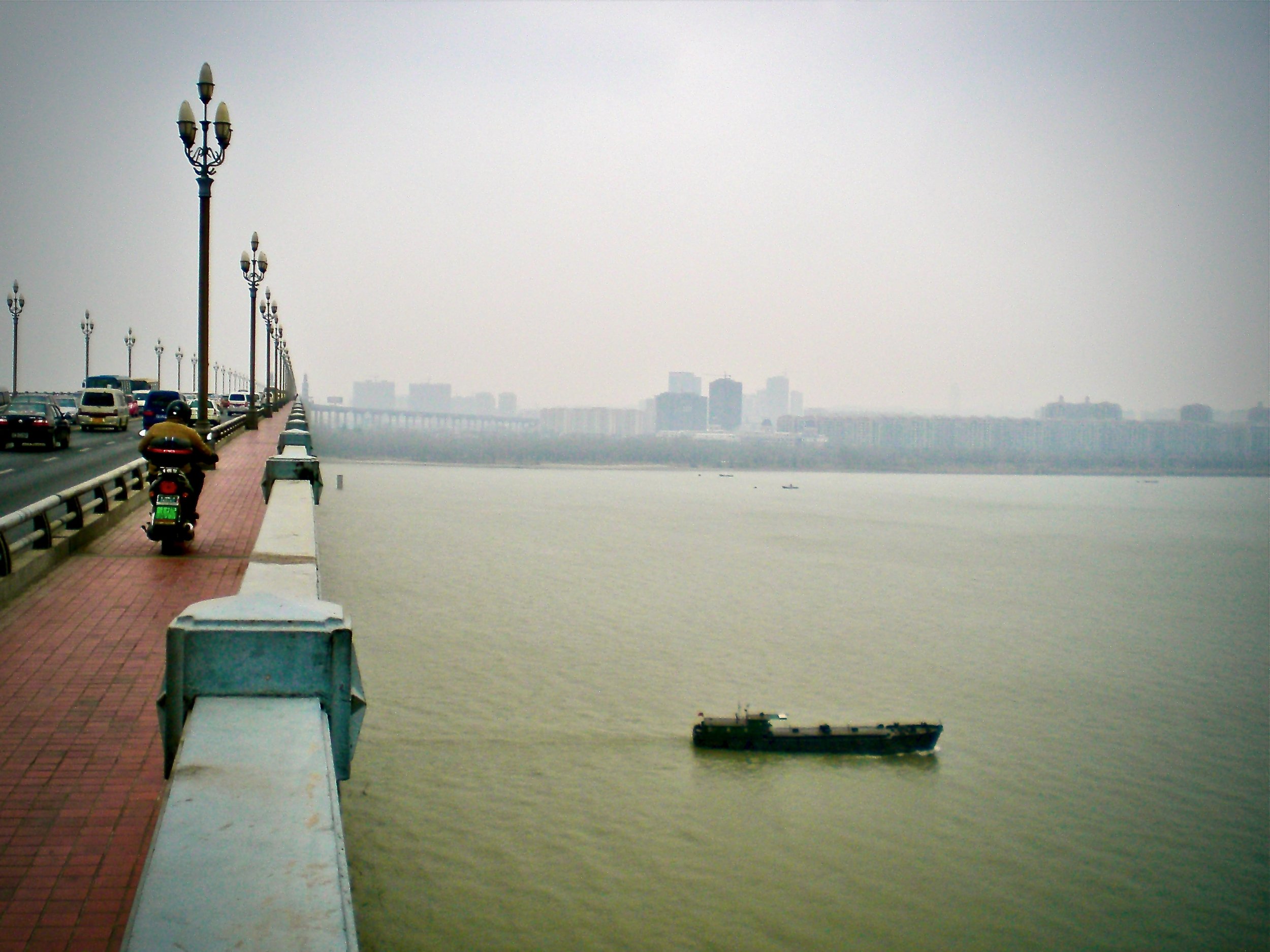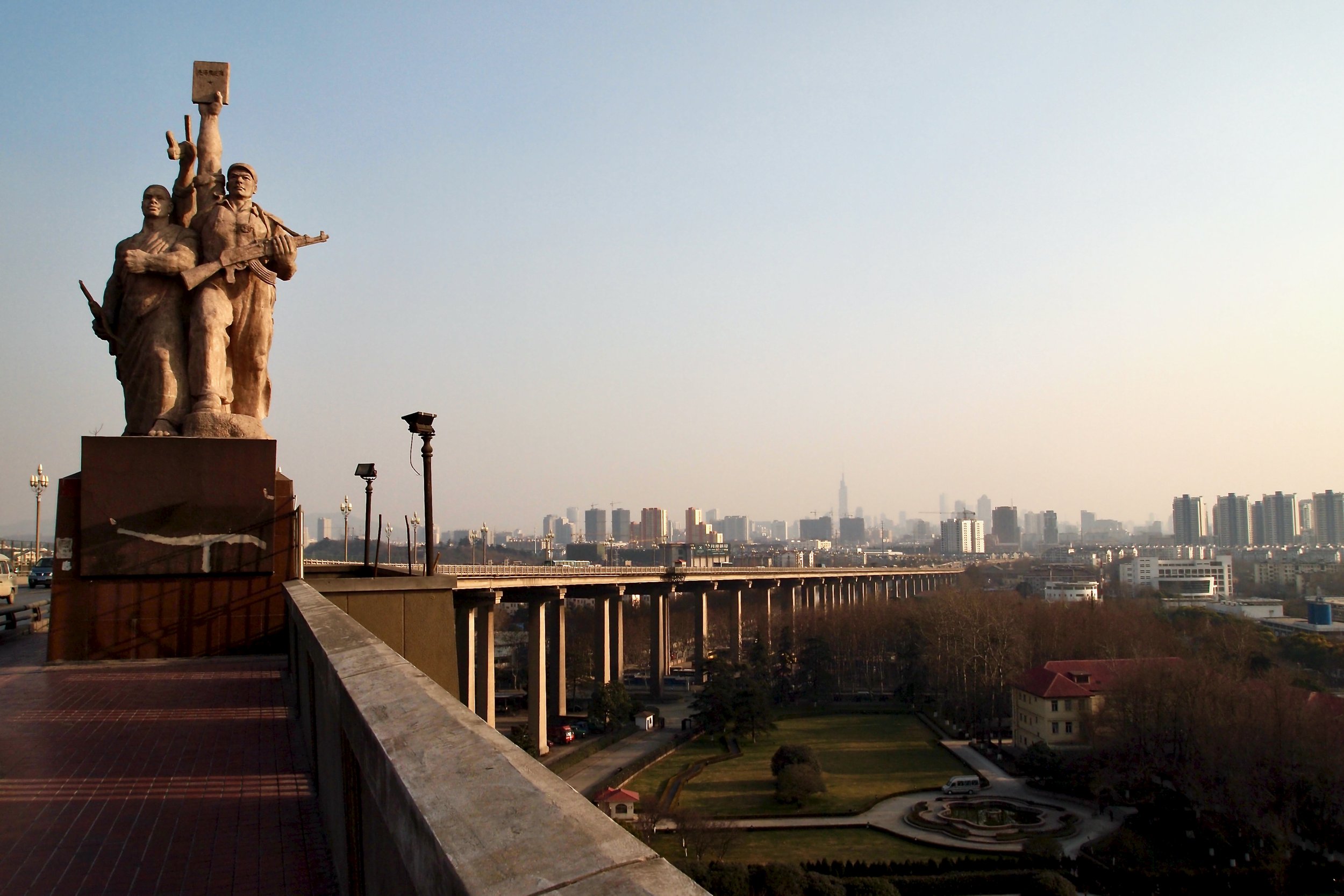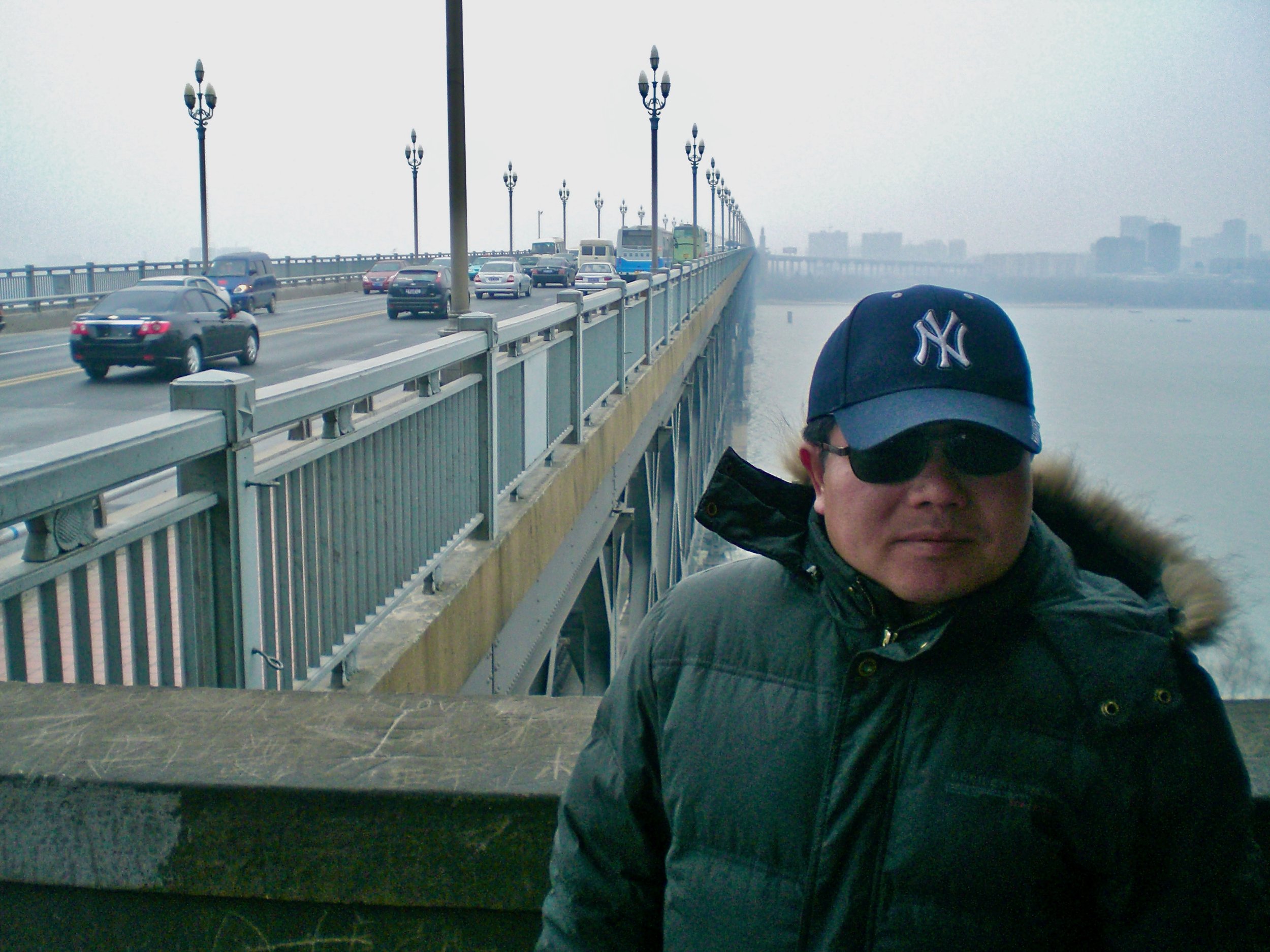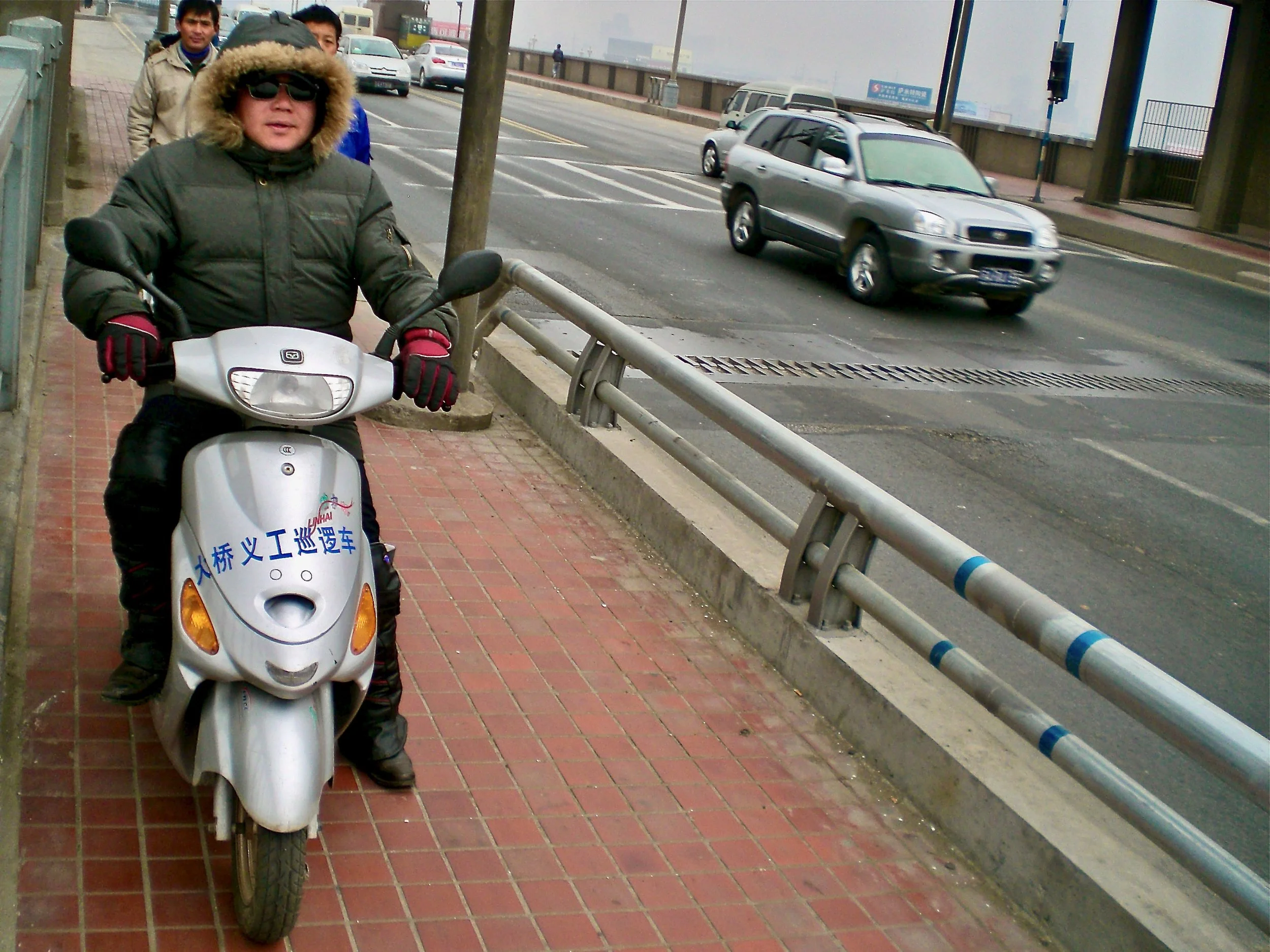
Suicide Angel
On A Scooter
Every two minutes, someone in China commits suicide. On the country's most famous bridge, one man tries to stop as many as possible.
Text and Photos: Remko Tanis
Chen Si looks at Saturday’s newspaper. 'Another One Jumped Off the Bridge', the headline on page B9 reads. Below the bold print, a photo shows the body of a 24-year-old who ended his life after his heart had been broken by a girl. He climbed over the low, steel barricade, looked at the muddy waters of the Yangtze below, and jumped.
News like that doesn’t even make the front page anymore in Nanjing, the ancient capital of the Chinese empire. Each year, 150 to 200 people come to this bridge to kill themselves. State media claim the span has overtaken the Golden Gate Bridge in San Francisco as the number one suicide spot in the world.
On a balmy Wednesday, Chen Si (44) took his daughter for a walk across the imposing Nanjing Yangtze River Bridge. At almost five kilometers long, four traffic lanes share the top deck with two sidewalks for pedestrians and motorbikes. On the lower deck, train tracks carry high-speed and regular trains between the megacities of Beijing, Shanghai and Chengdu.
Construction of the bridge was completed in 1968, when China was still a country of impoverished peasants. It was the first bridge crossing the Yangtze, China’s longest river. At the time it was also the longest bridge in the world carrying both trains and vehicles, an accomplishment which makes it the most famous bridge in China even today.

Chen had been living in Nanjing since 1990, but he had not visited the bridge until 2003. “Walking there with my daughter, we passed a girl. She was 18 or 19 years old. All of a sudden, she climbed over the side and jumped. In a flash I grabbed the collar of her coat. She was very light, so, without much effort I was able to pull her back onto the bridge.”
The girl told him she wanted to kill herself, because she had been cheated out of several thousand yuan (a few hundred dollars). Chen: “I talked some sense into her, until her family came to pick her up. That’s when I realized how easy it can be to save someone.”
A week later, he saw a news report about the large number of Chinese people who kill themselves in a year. That’s when it hit him. “What I had done for this girl, I would have to do for other people as well.“
Chen decided to start patrolling the bridge every weekend. His first patrol was on 19 September, 2003. He hasn’t missed a weekend since, first patrolling on foot, later on a motorcycle to move fast whenever he spots someone who might jump.
Each year 250,000 to 300,000 people commit suicide in China. That’s roughly 1 in 5,000 people. To compare: in the Netherlands 1 in 11,000 people ends his or her own life.
Suicide is the most common cause of death among Chinese 15- to 35-year-olds.
These are young people trying to escape the pressures of fast changing, contemporary China. Like the pressure to be number one in school, and of being the only child in the family. The pressure to find a good job, a suitable partner and the money to buy an apartment - which is unaffordable for the vast majority of twenty-somethings. The pressure to take care of aging parents, as society demands.

Recently Chen ‘celebrated’ another anniversary of his weekend job as a watchman on the bridge. He did this by doing what he always does on weekends: riding his motorcycle across the bridge, from sunrise to sunset.
To get to the top deck of the bridge, it takes 140 steps in a dark staircase ascending in one of the vast pillars of the bridge. Twenty steps up, a one-eighty turn, next twenty steps up, repeat. Each turn gets you further from the ground and, for the many who had the intention, closer to the fatal fall into the river.
Over the years, Chen has saved hundreds of lives. Like those of Zhang and Wang, two teenage girls he spotted recently.
“I saw them at eleven in the morning, standing on the east side of the bridge,” Chen recalls. “They had left their bags a bit further down the road and were just standing there, looking over the side, crying.”
Both came from the poor province of Anhui in Eastern China. For six months, they had been working in a factory on the northern shore of the Yangtze. Now they wanted to go home to help out with the rice harvest.
Chen: “The factory boss refused to pay their salaries, a combined total of 8,000 yuan. Moreover, he refused to let them go. They were only allowed to leave after signing a statement in which they confessed that the boss didn’t owe them anything. With no money to their names, they were out on the street. That’s when they decided they might as well jump into the river, rather than facing shame at home.''
Chen had a hard time convincing the girls not to end their lives. “I wanted to take them to Xinling Yizhang. That’s an apartment I rent, where people I have saved can come to terms with themselves. It’s a beautiful place, with a view of a peach tree and a pond. I hope it relaxes people and shows them life is beautiful.”
The girls, refusing to leave the bridge, were eventually taken away by the police. Alive.

Chen writes about all his experiences on his web log. It has earned him national fame. People with a heavy heart from all over the country now try to get in touch with him. Since 2003, Chen has given advice in person to over 7,000 people, not including his work on the bridge. He also spoke on the phone with over 16,000 people and even comforted 51,000 people via text message.
“I’m not a well-educated man,” Chen says. “I come from a backward region of China, so I can’t write very well. Moreover, I’m not qualified to advise others on how to save people. I just hope my blog inspires people who are feeling down.''
So far, his volunteer work has cost him 232,000 yuan, mostly from renting the apartment and buying gas for his motorcycle. Only part of this money is covered by donations. His regular job at a transportation company earns him 2,600 yuan a month, which he needs to take care of his wife and daughter.
Chen pulls his fur-lined coat over his blue New York Yankees cap. A cold wind haunts the high bridge. Even though the skies are grey, he wears sunglasses. “To protect my eyes from the sand the wind blows up from the river,” he shouts, to make himself heard over the noise of the traffic and trains underneath. Famous it may be, the Nanjing Yangtze River Bridge is no chill place to visit for fun or great views. And certainly not every weekend for years on end.
A man on the sidewalk across the bridge sits on his motorcycle, hunched down in his coat. “I pay special attention to people like that,” Chen says. “People who hang around in one place for too long, who don’t seem to be doing anything and who seem to be ignoring all others around them. A sick bird sings differently than healthy birds. Similarly, you can instantly recognize a person who wants to commit suicide. You can see it in their eyes: they don’t seem to be looking at anything anymore. Sometimes, all they wear is pajamas. Often they cry quietly, especially the women.''
The man on the motorcycle turns out to be using his cell phone. No case for Chen.

His latest rescue happened on a recent Saturday. “There was this 35-year old migrant worker who had lost all of his money. I didn’t spot him until he was hanging half over the side. I chased over there and was able to get him fully back on the bridge.”
It was a positive result Chen badly needed. “Not long before this rescue, I saw a man hanging around the public toilets on the bridge. I wasn’t able to get to him in time. I saw how he covered his face with his coat, scared to stare down into the depths. That's when he jumped.''
He says he learned not to care too much about these ‘misses’. “I’m all by myself doing this work. With my regular job I cannot be here all the time. I also have to be at home for my wife and daughter.''
Not that the missed rescues don’t haunt him. Chen leads the way to a small, windy restaurant at the foot of one of the bridge’s pillars. It’s nothing more than a badly lit gathering of a handful of campsite tables and low, plastic stools. Food is served in styrofoam trays.
Chen takes a sip of baijiu, strong Chinese liquor. Against the cold, he says. But it helps numb other feelings as well. He puts his glass down.
“Often enough I fail to save someone. Just when you think they’re not going to do it anymore, they jump. Every now and then those images return in my dreams. Some of them cry like wolves when they fall. That excruciating sound haunts my head at night.''
Chen found a solution that works for him at times when the haunts start to dominate his mind a bit too much. “I’ll get drunk with some friends. Then, the next morning, I visit the temple. After that, everything in life looks perfect again.''
He will need a lot of boosts like that once spring arrives. That’s the unfortunate season when most people climb those 140 steps in those dark pillars up the bridge, with only one way down in their heads.
Down and out.